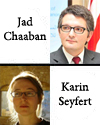Studies
02 September, 2012
Faith-based NGOs in Multi-Confessional Society: Evidence from Lebanon

Jad joined the American University of Beirut (AUB) as an Assistant Professor of Economics in September 2006, where he currently teaches development and agricultural economics. Prior to coming to AUB, he was an Economist in the World Bank's regional office in Beirut, where he undertook research related to poverty reduction and economic management, covering Lebanon, Syria, Jordan and Egypt. While at the Bank he contributed to drafting various policy strategies aiming to rationalize poverty alleviation, reduce unemployment, reform public sector expenditures and fostereconomic growth in the region. Jad is the president and founding member of the Lebanese Economic Association. He also currently serves as an expert for the Middle East Youth Initiative at the Wolfensohn Center for Development at Brookings; and as an Associate Researcher with the Toulouse School of Economics in France. Jad holds an MBA from the European School of Management (2000), a Masters in Environmental and Natural Resources Economics from the Toulouse School of Economics (2001), and a PhD in Economics (2004) from the same university. His current research interests include poverty and inequality in polarized societies; youth development and the economics of agro-food industries. He has published several scientific articles in international academic journals. ||Karin Seyfert: As project manager of the Socio-Economic Survey of Palestinian Refugees living in Lebanon, Karin developed the sampling and survey methodology of the study and managed consultation with stakeholders and co-investigators to develop the questionnaire. She designed the training materials and course for data collectors and also planned and supervised data collection. This involved more than 60 staff and took place simultaneously in five regions. 2627 questionnaires were completed. Karin supported statistical data analysis for the demographics, food security, public housing and health sections. She reviewed and edited the final report. Karin has worked as an analyst for Save the Children UK, the Lebanese Ministry of Social Affairs as well as London based consultancies Exclusive Analysis and E3G. She also held an appointment as an Economist in the Office of the Chief Economic Adviser with the Scottish Executive in Edinburgh. >Karin is about to complete her PhD thesis with the School of Oriental and African Studies, a college of the University of London. Her research involves a critical assessment of NGOs' ability to foster sustainable rural development. Karin holds an MA in Arabic and Economics from the University of Edinburgh and an MSc from the Toulouse School of Economics.